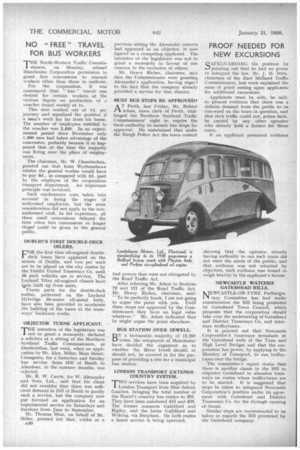NO " FREE " TRAVEL FOR BUS WORKERS
Page 26

If you've noticed an error in this article please click here to report it so we can fix it.
THE North-Western Traffic Commissioners, on Monday, refused Manchester Corporation permission to grant fare concessions to manual workers other than those in uniform.
For the corporation, it was announced that "free " travel was desired for certain workers at the various depots on production of a voucher issued weekly at is.
This sum worked out at id. per journey and equalized the position if a man's work lay far from his home. The number of employees entitled to the voucher was 2,450. In an experimental period since November only 1,200 men had taken advantage of the concession, probably because it so happened that at the time the majority was living near the place of employment.
The chairman, Mr. W. Chamberlain, pointed out that from Wythenshawe estates the general worker would have to pay 8d., as compared with 2d. paid by the employee of the corporation transport department. An important principle was involved.
Such emoluments were taken into account in fixing the wages of uniformed employees, but the same consideration did not apply to the nonuniformed staff. In his experience, all these small concessions delayed the time when fare concessions or longer stage4 could be given to the general public.
DUBLIN'S FIRST DOUBLE•DECK OILERS.
FOR the first time oil-engined doubledeck buses have appeared on the streets of Dublin, and two per week are to be placed on the city routes by the Dublin United Tramways Co. until 50 such vehicles are in service. The Leyland Titan oil-engined chassis have lien built up from units.
Frame parts for the double-deck bodies, patterned on the Leyland Hybridge 56-seater all-metal body, have also been provided to accelerate the building of the buses at the tramways Inchicore works.
OBJECTOR TURNS APPLICANT.
THE intention of the legislature was not to grant a monopoly, declared a solicitor at a sitting of the Northern Scotland Traffic Commissioners, at Dunfermline, last week, when an application by Mr. Alex. Miller, Main Street, Crossgates, for a Saturday and Sunday bus service -from Hill of Beath to Aberdour, in the summer months, was rejected.
Mr. R. W. Currie, for W. Alexander and Sons, Ltd., said that his client did not consider that there was sufficient demand in Hill of Beath to justify such a service, but the company now put forward an application for an experimental service on Saturdays and Sundays from June to September.
Mr. Thomas Blair, on behalf of Mr. Miller, pointed out that, whilst at a n40 previous sitting the Alexander concern had appeared as an objector, it now figured as a competing applicant. The intention of the legislature was not to grant a monopoly in favour of one concern to the exclusion of others.
Mr. Henry Riches, chairman, saki that the Commissioners were granting Alexander's application, having regarl to the fact that the company already provided a service for that district.
MUST BUS STOPS BE APPROVED?
AT Perth, last Friday, Mr. Robert Adam, town clerk of Perth, challenged the Northern Scotland Traffic Commissioners' right to require the local authority to submit bus stops for approval. He maintained that under the Burgh Police Act the town council
had powers that were not abrogated by the Road Traffic Act.
After referring Mr. Adam to Sections 72 and 121 of the Road Traffic Act', Mr. Henry Riches, chairman, said: " To be perfectly frank, I am not going to argue the point with you. Until these stops are approved by the Commissioners they have no legal value whatever." Mr. Adam indicated that he might argue the point elsewhere.
BUS STATION OVER IRWELL.
DY a favourable, majority of 12,297
votes, the ratepayers of Manchester have decided the argument as to whether the River Irwell should, or should not, be covered in for the purpose of providing a site for a municipal bus station.
LONDON TRANSPORT EXTENDS COUNTRY SYSTEM.
TWO services have been acquired by London Transport from Blue Saloon Coaches, bringing the total number of the Board's country bus routes to 201. They have been numbered 415 and 438. The former connects Guildford and Ripley, and the latter Guildford and Woking, via Burpham. On both routes a faster service is being operated.






























